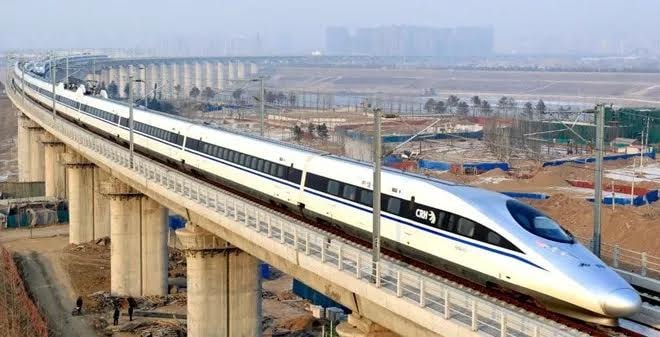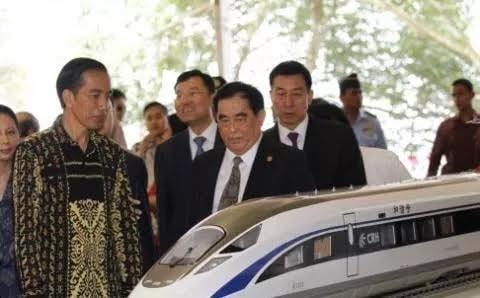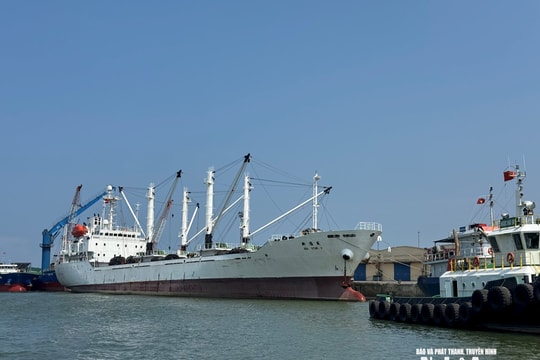Billion-dollar Chinese deals left hanging by the world
With cheap bidding prices and easy bidding conditions, it was thought that China would be able to penetrate basic construction projects everywhere in the world. However, it seems that many countries are beginning to realize the problem with their leniency when approaching Chinese contractors.
The reasons for the cancellations, whether announced directly or just speculated, are related to the transparency in bidding or the quality of construction or production in China is not up to the standard for the partner to be completely trustworthy. Here are some of the high-profile cancellations in the past few years.
Mexico agrees to pay China $1.3 billion to cancel contract
On November 3, 2014, China probably popped the champagne to celebrate when the Mexican government announced that China Railway Construction Corporation (CRI) had won the bid to build Mexico's first high-speed railway, and the first in Latin America.
 |
| China high-speed rail |
But surprisingly, just 3 days later, on November 6, 2014, Mexico suddenly announced the cancellation of the above decision. During the day, Mexican Transport Minister Gerardo Ruiz Esparza appeared on television to announce to the whole country that the President of this country had decided not to award the project to China and would rebid.
According to him, public opinion in this South American country has raised many questions about transparency and corruption in handing over the project to China. The opposition has criticized the government for being too favorable to the Chinese corporation.
The 210-km high-speed railway connects the capital with the central city of Queretaro. The contract, worth 3.76 billion USD, includes railway construction, equipment and train procurement, and train maintenance. Construction is expected to begin in December 2014 and be operational in 2017. The goal is to transport 23,000 passengers per day.
US: Canceled $12 billion contract because of distrust of "Made in China" quality
"Chinese train cars do not meet US standards" - that is one of two reasons that XpressWest, the company that cooperated with CRI in the project to build a high-speed rail across America, gave when it announced the cancellation of the mega contract worth up to 12.5 billion USD on June 9, 2015.
This joint project took 4 years of negotiation, and in September 2015, the two sides signed this contract after the historic visit of Chinese President Xi Jinping to the United States. XpressWest and CRI will jointly build a 370 km long high-speed rail line connecting the two cities of Los Angeles, California and Las Vegas, Nevada, USA.
After a research process, the joint venture company XpressWest said it decided to end its relationship with CRI due to difficulties related to the project completion deadline as well as difficulties from CRI in having to obtain licenses from authorities to match the project's operational stages as required by the US side.
Without sufficient documents, China is not allowed to build railways in Indonesia.
In 2015, Indonesia and China agreed to sign a $5.5 billion contract to build the Jakarta-Bandung high-speed railway. However, in early 2016, the Indonesian press reported that the country’s Ministry of Transport had asked the Chinese investors to suspend the project due to construction permit issues.
 |
Indonesian President Joko Widodo and General Director of China Railway Corporation Sheng Guangzu attended the groundbreaking ceremony of the Jakarta-Bandung high-speed railway project. |
Previously, the Indonesian Ministry of Construction had only granted the Chinese side a construction permit for the first 5km of this line out of the total length of 142.3km. This permit was only for the purpose of groundbreaking.
According to Indonesian officials, this is the first time the country has implemented such a large project. Therefore, according to Indonesian Transport Minister Ignasius Jonan, it is impossible to grant a license to the high-speed rail project invested by PT Kereta Cepat Indonesia China (KCIC) when many documents related to the project have not been fully submitted.
"This is the first time we have done a project of this type. We cannot grant a license based only on assessments," Mr. Jonan affirmed.
Minister Jonan said that among the 11 documents required to be submitted to the ministry for the construction permit, KCIC lacked detailed information on the project design, technical illustrations, field data as well as technical specifications of the project.
In addition to the lack of necessary documents, the Chinese contractor also had the documents returned because they were in Chinese without being translated into English. "We want to ensure that the government will not suffer the consequences if the investor stops the project midway," Mr. Jonan added.
UK: Letting China participate in nuclear projects is worrying
On July 30, 2016, Reuters reported that British Prime Minister Theresa May made a very tough decision to temporarily suspend the approval of the Hinkley Point nuclear power plant project due to concerns about national security as the project has investment from China.
Reuters quoted Vince Cable, former British Business Secretary, as saying: "When we were in government, Theresa May was unhappy about our eagerness to attract investment from China." According to Vince, Mrs. May's concerns about the above issue are related to national security, especially with important nuclear projects like Hinkley Point.
The project to build two nuclear reactors has the main partner being the French Energy Group EDF and investment from China General Nuclear Power Corporation (CGN). It was once considered an achievement of former British Prime Minister David Cameron in opening up the UK to foreign investment.
However, on July 29, just hours before the signing ceremony, Mrs. May's government announced that it would review the project. EDF said it was completely surprised by the British government's decision. The UK and EDF reached a commercial agreement on the Hinlley Point project in 2013.
China joined the project two years later, as Mr Cameron and Chinese President Xi Jinping vowed to build a "Golden Era" in relations between the two countries.
The decision to postpone the project is seen as a major blow to Beijing's efforts to strengthen ties with Britain.
According to Vietnamnet/Infonet
| RELATED NEWS |
|---|


